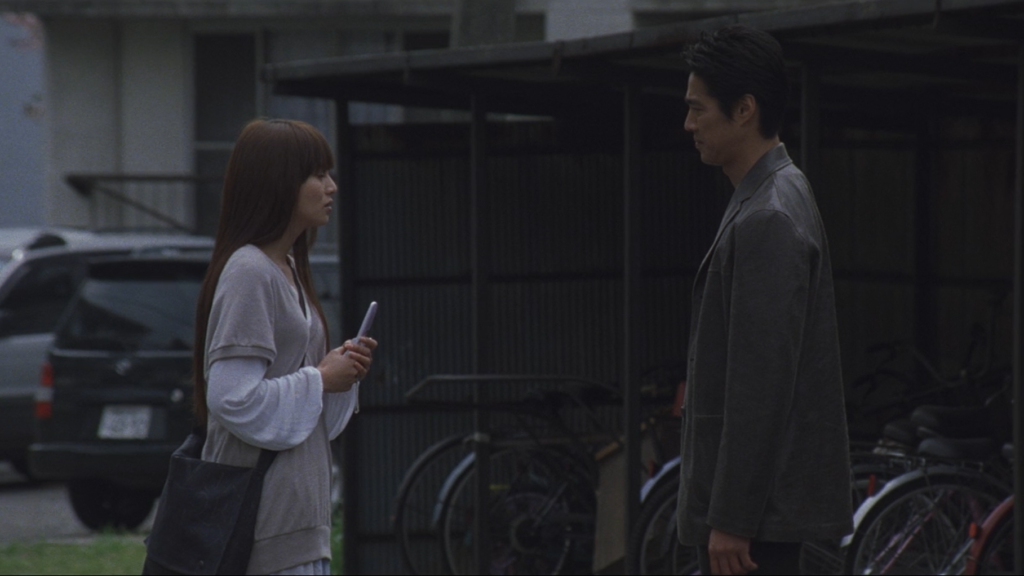One Missed Call
2003

Rated: R
Genre: Horror
Country: Japan
Run-Time: 1h 52min
Directors: Takashi Miike
Cast
Yumi Nakamura………..….Ko Shibasaki
Hiroshi Yamashita……..…Shinichi Tsutsumi
Natsumi Konishi……………Kazue Fukiishi
Anna Nagata…………………..Yoko Okazaki
This is my 100th review. I considered using the milestone to finally write a review for one of the many films dear to my heart, like Audition or The Wailing or Martyrs. Instead, I decided to finally watch a film I’ve been hesitant to see because of its dodgy place in the J-horror canon: Takashi Miike’s One Missed Call.
When it was released in 2003, Western critics dismissed One Missed Call, calling it a Ringu ripoff. And it is hard to argue that they were wrong. Ringu revolves around a people who have doomed themselves after watching a cursed V/H/S tape. One Missed Call deals with a cursed cell phone call that announces your time of death. Both films involve an investigation by people (a man and a woman) who have skin-in-the game, as they know- and later are- people who have received the curse. And both investigations seem to center around ghoulish secrets surrounding creepy little girls.
But One Missed Call suffered double because of its relative tameness when compared to Takashi Miike’s Audition, Ichi the Killer and Gozu– all of which are arguably better, more original, movies that offer more audacious horror, gore and surreal fantasies. In the filmmaker’s vast filmography, One Missed Call stands out as that one time Miike tried to make a conventional J-horror to appeal to the masses.
And then there is that awful 2008 American remake that sits at 0% on Rotten Tomatoes. The remake was even considered on some critical polls as the second worst film of the 00s.
So why waste my 100th review on a film that has been the subject of so much criticism.
Because there is another way to look at One Missed Call legacy that paints the film in a much better light.
For one thing, the film was actually well-received by Japanese audiences at the time it was released. Hell- even the 2008 American remake garnered a modest profit for Warner Brothers, and that was at a time audiences were starting to tire of J-Horror.
Based on the Japanese novel Chakushin Ari by Yasushi Akimoto, Miike’s adaptation even ended up creating a Japanese franchise that included two sequel films sandwiched between a 10-episode television series.
Having now seen the film for myself, I can’t help but think its reputation- at least in the West anyways- wasn’t more a victim of the time than to it actually being a bad horror film. But when I started reading more recent articles about Miike’s One Missed Call, I started to notice that a bit of a reevaluation has been taking place from those still writing about J-horror. Twenty years after its release, One Missed Call seems to be creeping up more and more best J-horrors of all-time lists.
Why?
Well, for one thing, there’s its plot.
One Missed Call begins in a restaurant where the twenty-somethings at the table all seem just a little too connected to their flip-phones. (Remember when cell phones looked like that?) The scene well captures those early days of texting while being at a social gathering. But then one woman mentions another woman’s phobias. A girl named Yumi (Ko Shibasaki) is afraid of looking through peepholes.
Her friend, Kenji, follows with a story about a friend who experienced a supernatural encounter in the shower. Something about a boney white arm on his shoulder. And we cut back to the group and…wait…is that a boney white arm on Yumi’s shoulder?
It’s a wonderful scene full of that Takashi Miike magic. Miike may be telling a more conventional ghost story, but his love for filmmaking still shows in every scene.
Like in the next scene, when Yumi’s friend’s Yoko gets a call from her own phone number in the restaurant’s washroom. The ring tone, one she says is not her own, plays a song that is chilling. It sounds like it would belong in a haunted carnival. She doesn’t answer, but when she listens to the message she hears her own voice, surprised that it is raining. Then comes a scream.
Later, we learn that the call was dated two days into the future. Yikes!
Needless to say, Yoko will die at the exact date and time the call predicted and this starts a panic. Turns out, others have died too after similar calls. An urban legend begins to spread about a vengeful spirit that is killing people and using the caller lists on their phones to mark their next victims. Potential targets start getting ostracized by panicked friends who beg them to take their numbers off their phone.
The social-techno sub-text in this film is nowhere near as deep as in Kurosawa’s Pulse, but it is there- especially in One Missed Call’s early act.
But Miike is a director that is much more interested in psychological aspects of a story and soon the focus shifts to themes of childhood trauma. We learn that Yumi, the film’s protagonist, was abused by her mother. Similar patterns show up in their investigation of a girl named Mimiko Mizunuma who died after a fatal asthma attack, though her mother was never charged with neglect. Mimiko’s living younger sister also suffered injuries. Some suspect the girls to be victims of Munchausen syndrome by proxy. Miike has moved the story more into his wheelhouse.
I generally find the female protagonists in most J-horrors a bit lacking in the personality department, but in One Missed Call I found Shibasaki’s Yumi to be a captivating, fully fleshed out, character with interesting flaws and a backstory. She even has agency beyond being simply the potential love interest of Yamashita, a young detective who is trying to prove his sister’s death was not an accident.
Miike, who has made a number of films that are categorized as Asian Extreme, does nothing with One Missed Call that really stretches the limits of decency. Still, One Missed Call offers plenty of gore and even a few scares, especially in the film’s final act. Even at his most commercial, Miike’s mastery at making memorable sequences of cinematic mayhem continues to shine. This is clearly a ghost story, but when things started spiraling completely out of control I couldn’t help but wonder if Miike wasn’t slightly implying that at least some of the horrors were just in Yumi’s head.
It is true that One Missed Call doesn’t have the iconic scares of Ringu or Ju-On: The Grudge, and it is nowhere near as profound as Kurosawa’s Cure or Pulse. It did pretty well at the box office, so it can’t even claim hidden gem status like Noroi: The Curse. The simple truth is that Miike’s knack for pacing and camerawork makes One Missed Call more fun than a lot of its J-horrors counterparts and that is at the heart of its current re-evaluation. It doesn’t hurt that One Missed Call’s cryptic ending and commentary on the lingering effects of abuse ends up making it just cerebral enough to hold its own weight.
Besides, the difference between “rip-off” and “homage” is connotative, based only on how much one likes a film. So let me end by saying that Miike’s One Missed Call is not just a delightful homage to Hideo Nakata’s Ringu, but a sublime homage to J-horror itself.
